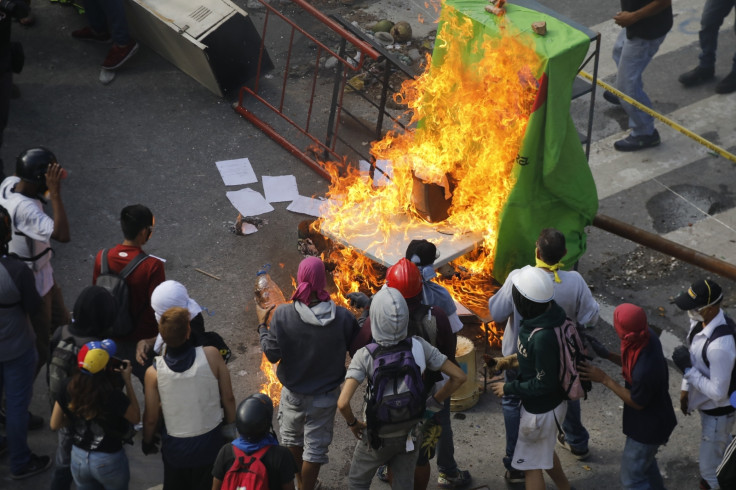Venezuela: Youth opposition leader killed in violent election clashes
Critics accuse President Nicolás Maduro of trying to seize powers with a new constituent assembly.
One of the leaders of a youth opposition party in Venezuela has been killed during widespread violence that marred Sunday's (30 July) controversial election for a new constituent assembly.
President Nicolás Maduro hailed the election result, with the government claiming that more than 8 million people – or 41% of the country's electorate – voted in favour of a new assembly that can rewrite the country's constitution and override the opposition-controlled congress.
The opposition, which accuses Maduro of trying to tighten his grip on power, refuted the claim, arguing the election was rigged.
Venezuela has been rocked by violence in the lead up the vote.
At least ten people were killed on Sunday during widespread protests and clashes with police. Another 58 were detained, according to local media.
Ricardo Campos, the youth secretary with the opposition Acción Democrática was among the deaths. He was shot dead during a protest in the north-eastern town of Cumaná.
A 39-year-old lawyer, who stood in the election, was also reportedly killed in his home in Bolívar state, the BBC reported.
The opposition has called for further demonstrations on Monday, according to El Nacional.
Freddy Guevara, vice-president of the National Assembly, took to Twitter to call on citizens to rally against "the massacres".
El Nacional also reported that the country's public prosecutor is investigating the deaths.
After casting his vote, Maduro said it was "the first vote for peace." He criticised other governments which have been critical of Venezuela over human rights concerns of trying to stop "21st-century socialism."
"The 'emperor' [US President] Donald Trump wanted to halt the Venezuelan people's right to vote. A new era of combat will begin. We're going all out with this constituent assembly," he said.
8. Mañana: 12m protesta donde estés (apaga tu carro, toma tu calle, baja de tu ofc) y 5pm marcha contra la masacre (en Ccs Av Fco Miranda)
— Freddy Guevara (@FreddyGuevaraC) July 31, 2017
Reactions to election result

Venezuela has stirred criticism over alleged human rights abuses and has been hit by sanctions from the European Union and the US.
Last year, the country was suspended from the regional trade bloc Mercosur for violating the organisation's democratic principles. Caracas described the suspensions as a coup attempt. The bloc is composed of Argentina, Brazil, Paraguay and Uruguay.
Argentina said it would not recognize the results of what its Foreign Ministry called an "illegal election" and Brazil, Peru and Chile called for steps to restore dialogue.
"This election violates the Venezuelan constitution's norms and contravenes the sovereign will of the people as represented in the National Assembly," the Peruvian Foreign Ministry was quoted as saying.
"The Brazilian government condemns the destruction of the constitutional freedom to demonstrate and repudiates the kind of violent repression by state forces and paramilitary groups of the kind we saw throughout the day," the Brazilian Foreign Ministry said.
Following the election result, the US threatened to apply further sanctions. US ambassador to the UN, Nikki Haley, dismissed the vote as a "sham election", saying the US will not accept an illegitimate government.
Unnamed sources told Reuters that a new round of sanctions could target Venezuela's oil sector. The source ruled out a ban on Venezuelan oil shipments to the US, but could block sale of lighter US crude oil that Venezuela mixes with its heavy crude before exporting.
Maduro’s sham election is another step toward dictatorship. We won't accept an illegit govt. The Venezuelan ppl & democracy will prevail.
— Nikki Haley (@nikkihaley) July 30, 2017
© Copyright IBTimes 2025. All rights reserved.






















